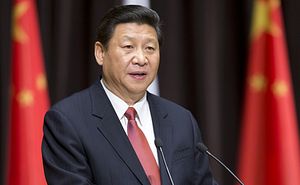Since ascending to the Chinese Communist Party’s top post in November 2012, Xi Jinping has confounded observers. While his political strategy has entailed tightening the CCP’s control over ideology, cracking down on official corruption, repressing dissent, and championing a more nationalistic foreign policy, he has announced an unusually bold economic reform blueprint.
The world will soon find out whether Xi’s politically conservative course is intended to facilitate his pro-market economic reforms. Having spent 2013 consolidating his position and formulating his agenda, this year Xi will have to begin delivering on his promises and demonstrating that he is as capable of applying power as he is at accumulating it. His success will depend on how he addresses three major challenges.
The first challenge confronting Xi in 2014 is undoubtedly implementation of his economic-reform package, which has aroused both excitement and skepticism since it was unveiled in mid-November. Optimists point to the package’s ambitious goals as evidence of Xi’s commitment to reform, while critics cite its vagueness and lack of a specific timetable as grounds for caution.
In order to prove the skeptics wrong, Xi must translate rhetoric into policy, and policies into concrete, measurable results. This means starting the new year by implementing reforms that require only administrative action, such as granting licenses to private banks, increasing competition by removing barriers to entry for private firms, liberalizing interest and exchange rates, and extending residency rights to migrant laborers in small cities and towns.
Xi will have to follow these measures with legislation that formalizes some of the most critical reforms. Here, land reform will be the most difficult issue. Xi’s agenda offers only vague promises of increased property rights for farmers, while recent government pronouncements indicate that the bureaucracy wants to restrict such rights. In this context, Xi must convince the public that he will not allow vested interests to block change.
The second major challenge that Xi faces in 2014 is sustaining his highly popular – and hugely risky – anti-corruption campaign. Given that Xi has ruled out mobilizing the Chinese public to support his reform plans, his only means of forcing the bureaucracy to comply with his agenda is the threat of corruption investigations and prosecutions.
But this strategy will be difficult to execute, owing not only to the vast scale of corruption, but also to its critical role in distributing rents among factions and interest groups. An anti-corruption campaign that targets a large number of Chinese officials is likely to result in alienation, discontent, and division among the ruling elites.
The real litmus test of Xi’s intentions will be whether his government prosecutes Zhou Yongkang, a former member of the Politburo Standing Committee, the CCP’s highest policymaking body. According to official reports, Xi’s anti-graft noose has been tightening around Zhou since the arrest of many of his former lieutenants.
But prosecuting even a retired member of the Politburo Standing Committee would break a long-standing taboo. Beginning with Deng Xiaoping, the post-Mao regime has worked hard to ensure the physical security of its top officials, thereby avoiding Mao’s mistake of turning internal power struggles into life-and-death contests in which nobody is safe. Thus, while ordinary Politburo members have been targeted in the past (three have been imprisoned), members of its Standing Committee have been off limits.
So now Xi faces a dilemma. If he abides by the unwritten rule against prosecuting even former Standing Committee members, he risks undermining the credibility of his anti-corruption campaign. But if he puts his former colleague in jail, he could undermine cohesion among China’s top leadership.
The third challenge that Xi faces is avoiding an unnecessary conflict with Japan. China’s recent announcement of an Air Defense Identification Zone covering the disputed Senkaku Islands (called the Diaoyu Islands in China), followed by Japanese Prime Minister Shinzo Abe’s visit to the controversial Yasukuni Shrine, suggest that the bilateral relationship – already at its lowest point in 40 years – will continue to deteriorate.
Xi and his advisers should not succumb to the illusory belief that such a conflict would boost their standing with the Chinese public. Japan, with its U.S. backing, would inflict a humiliating military defeat on China. With his political future depending on his ability to deliver on his reform promises, the last thing Xi needs is a foreign-policy distraction – let alone a disastrous military misadventure.
The stakes are high for Xi and China in 2014. That means the stakes are high for the rest of the world as well.
Minxin Pei is Professor of Government at Claremont McKenna College and a non-resident senior fellow at the German Marshall Fund of the United States.
Copyright: Project Syndicate, 2014. www.project-syndicate.org

































